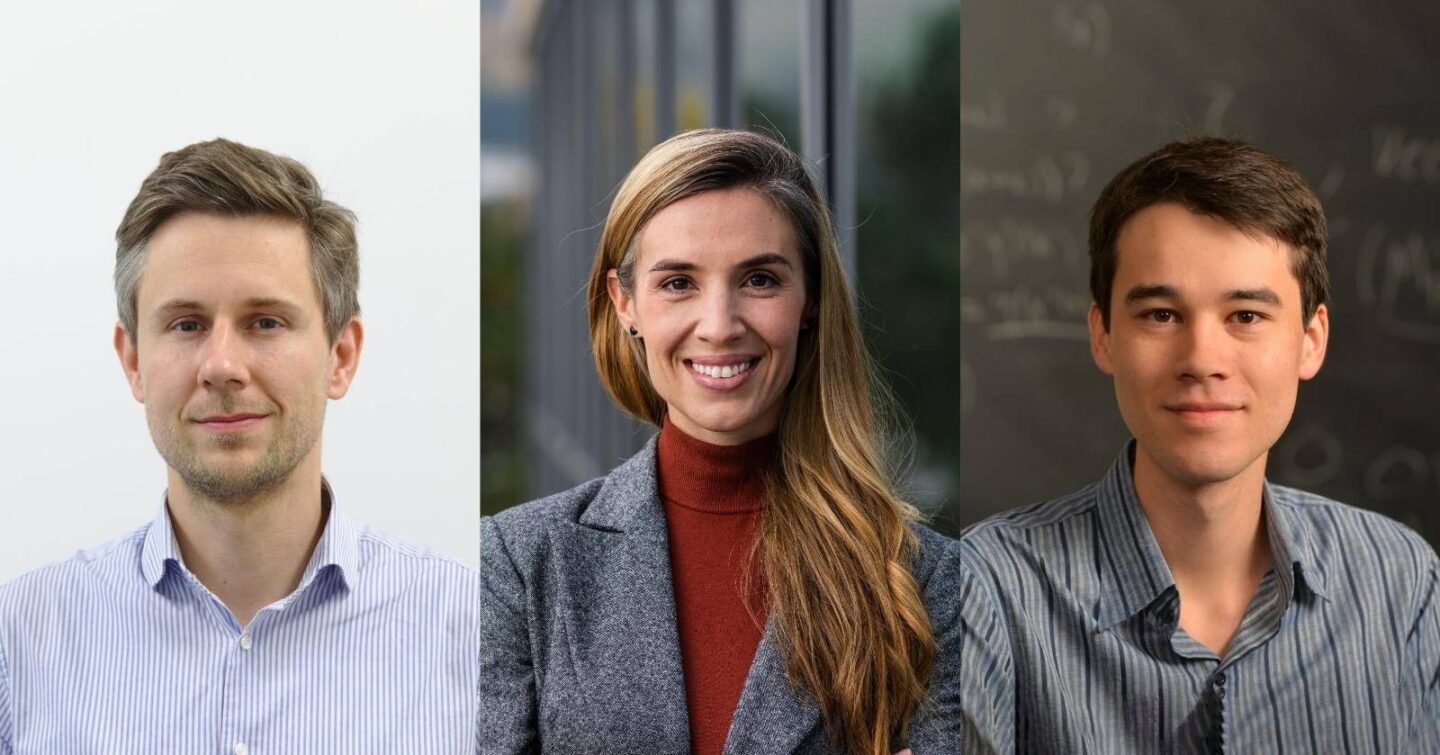November 22, 2022
ISTA Researchers are Awarded ERC Starting Grants
Three up-and-coming scientists at ISTA receive funding for their research projects
In 2022, the European Research Council (ERC) awarded the Institute of Science and Technology Austria (ISTA) with a record number of twelve grants – three of the new ERC Laureates are assistant professors Florian Schur, Kimberly Modic and Matthew Kwan. Their excellent novel approaches in their respected research fields are now supported by the ERC Starting Grants.

The ERC is one of the leading European funding organizations, which focuses on supporting all disciplines of remarkable research. Its Starting Grants will allow younger scientist to boost their independent research and make an impact with scientific breakthroughs. Three ISTA scientists have impressed the ERC jury with their proposals and are now eager to begin their projects with the funding.
ActinID – Understanding the actin cytoskeleton
Florian Schur and his structural biology group at ISTA are focusing on the structural and functional principles that control cell migration or the movement of cells. His expertise lies in cryo-electron microscopy, the noble price-winning method that revolutionized the analysis of structures of biomolecules in high resolution. The actin cytoskeleton is essential for cell migration. It is thought to be regulated by a competitive interplay between actin-binding proteins (ABP), the biochemistry of actin filaments, and actin filament geometry. All of them are dependent on each other and guarantee the correct function of the cytoskeleton. However, it is still unknown how this entanglement of filament biochemistry, filament geometry, and ABPs determines the cytoskeleton remodeling in the dynamic cell migration. To answer this question, Florian Schur will try to establish a molecular atlas ‘ActinID’ of the actin cytoskeleton during cell protrusion in the migration process. For his research project, Schur is granted a total value of 1.5 million euros from the ERC. “We will develop novel cryo-electron tomography workflows that visualize in 3D the molecular components driving cell migration. We will gain insights into the steering of directional cell movement by the dynamic filament organization of the actin cytoskeleton.” Schur explains.
TROPIC – New approaches in Quantum Computing
Also winning the Starting Grant from ERC of a total of 2.32 Million Euros this year is ISTA Assistant Professor Kimberly Modic leading the group: ‘Thermodynamics of quantum materials at the microscale’. Modic’s project named TROPIC will design new experiments to uncover the properties of quantum materials that are expected to revolutionize quantum computing. Conventional approaches that rely on local interactions between qubits (quantum equivalents of traditional computing units ‘bits’) suffer from seemingly insurmountable problems, such as controlling quantum decoherence while still achieving a useful number of qubits. Alternative approaches based on nonlocal interactions, such as Majorana fermions, could provide a solution but clear evidence for their existence is missing. TROPIC aims to identify features of prospective useful materials like quantum spin liquids and superconductors by developing probes to study their dynamic response in magnetic fields approaching 100 tesla. “We laid the groundwork to do these experiments in relatively small magnetic fields in our lab at ISTA. TROPIC opens a door for us to extend our capabilities to the highest magnetic fields, where new states of matter are expected and new techniques are needed to explore them. Since our technique applies to broad classes of quantum materials, we believe TROPIC will positively impact the community in general as a step towards developing a mainstream user capability,” TROPIC’s investigator-in-lead Kimberly Modic says.
RANDSTRUCT – Useful Randomness
Matthew Kwan, Assistant Professor leading the ‘Combinatorics and Probability’ group at ISTA is one of the grantees of the ERC Starting Grant 2022. The grant of 1.34 Million Euros opens up many avenues for his group to pursue their project named RANDSTRUCT. Combinatorics is the mathematical study of discrete structures such as networks, permutations, or set systems. Over the years, it has become clear that randomness plays an inseparable role in combinatorics. Probabilistic arguments that are non-constructive are a powerful way to prove the existence of various kinds of combinatorial objects in math, and the study of random discrete structures has illuminated nearly all fields of combinatorics. In RANDSTRUCT Kwan proposes a program to achieve a deeper understanding of this role of randomness in combinatorics, emphasizing the relationship between “structured” objects and random or “random-like” objects. The project will be driven by the investigation of several concrete combinatorial problems, particularly in the areas of Ramsey theory and design theory. Commenting on how this grant positively impacts his research, Kwan says: “Many of the most important breakthroughs in maths have come from unexpected combinations of different ideas and perspectives. This grant will allow me to build a group of students and postdocs with diverse skills and experiences, which is the ideal environment for the development of new ideas that will be instrumental for this project.”
ERC Announcement:
https://erc.europa.eu/news-events/news/starting-grants-2022-call-results



